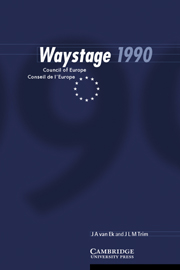Book contents
- Frontmatter
- Contents
- Preface
- Introduction
- 1 The objective: description
- 2 Components of the specification
- 3 Language functions
- 4 General notions
- 5 Themes and specific notions
- 6 Dealing with texts: reading and listening
- 7 Writing
- 8 Sociocultural competence
- 9 Verbal exchange patterns
- 10 Compensation strategies
- 11 Learning to learn
- 12 Degree of skill
- APPENDICES
- A Pronunciation and intonation
- B Grammatical summary
- C Word index
A - Pronunciation and intonation
Published online by Cambridge University Press: 01 March 2010
- Frontmatter
- Contents
- Preface
- Introduction
- 1 The objective: description
- 2 Components of the specification
- 3 Language functions
- 4 General notions
- 5 Themes and specific notions
- 6 Dealing with texts: reading and listening
- 7 Writing
- 8 Sociocultural competence
- 9 Verbal exchange patterns
- 10 Compensation strategies
- 11 Learning to learn
- 12 Degree of skill
- APPENDICES
- A Pronunciation and intonation
- B Grammatical summary
- C Word index
Summary
Communication depends upon mutual intelligibility. That is to say that it is only possible if the language forms produced by the speaker are identified and understood by the listener. It is therefore the responsibility of speakers to pronounce them as intelligibly as possible, and it is also the responsibility of listeners actively to seek to identify what has been said and to use appropriate repair procedures if they are unable to do so. The ease of communication depends largely on the extent to which speaker and listener share a common practice. Speakers of the same dialect understand each other without difficulty, but widely separated dialects may well be mutually unintelligible. For purposes of national (or international) communication standard languages with standard pronunciations have generally developed, based usually on the speech of educated people in capital cities, or that of some other prestigious social group. The standard language is widely used in the education system, in the serious media and in middle-class life and culture. This is not to say that all users of a standard pronunciation sound alike. The speaker's socio-regional provenance may be clearly marked and easily detectable by an experienced listener. It may well be important to the individual's sense of identity that this should be so (e.g. Scottish English), but conformity to national norms is sufficient to ensure ready mutual intelligibility on a national scale.
- Type
- Chapter
- Information
- Waystage 1990Council of Europe Conseil de l'Europe, pp. 68 - 74Publisher: Cambridge University PressPrint publication year: 1999



